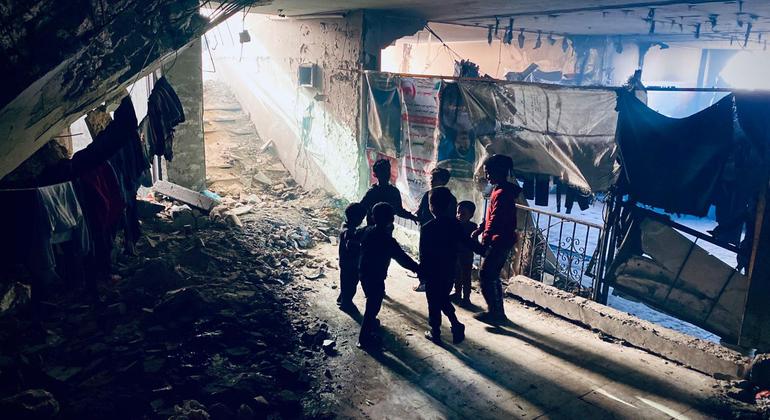WHO regional head voices deep concern over escalating situation in Middle East

The past two weeks have seen a variant of the poliovirus type 2 detected in wastewater samples in Gaza, deadly military airstrikes in several neighboring countries and confirmed famine in Sudan’s North Darfur state, among other challenges.
Rebuilding the health system
WHO Regional Director Dr Hanan Balkhy has voiced deep concern about the ongoing escalation across the region, characterised by “deadly attacks on civilians, political entities and infrastructure”, which “rapidly raises the risk of a wider war”.
Civilians who have already suffered from violence, famine and disease do not deserve further threats, she said.
“Health systems must be rebuilt, not destroyed, and developed further to withstand further shocks. has the potential to affect us all, like the next pandemic,” she speaks.
In the face of escalating political tensions, she stressed that “every diplomatic effort must be made to prevent this worrying situation from getting worse.”
Polio Prevention Campaign in Gaza
Meanwhile, polio in Gaza is a concern. Dr Balkhy warned that although no cases have been detected yet, children are still at high risk.
In response, WHO is working with the Ministry of Health in Gaza and the United Nations Children’s Fund (UNICEF) on a range of measures, including polio vaccination campaigns that will begin soon.
“Let me be clear that we need a ceasefire, even a temporary ceasefire, to be able to carry out these operations successfully. Otherwise, we risk the virus spreading further, including across borders.,” she speaks.
Vaccine is on the way
About 500,000 children under eight years of age will be targeted for the two vaccination campaigns, said Dr Hamid Jamari, Director of the Polio Eradication Programme at the WHO Regional Office.
WHO Director-General Tedros Adhanom Ghebreyesus has authorized the release of sufficient doses of the new oral polio vaccine type 2 from the global stockpile held in Indonesia, he said.
“Of course, The challenge is when can we get these vaccines to Gaza?,” he said, citing issues such as current regional tensions, logistical difficulties and flight cancellations.
“And once the vaccine gets there, we need a major change in the current environment, not just a ceasefire and peace so that children can get vaccinated, but we need freedom of movement.”
Planning a ‘big campaign’
“Everything has to be in place, including the cold chain and cold chain equipment,” added Dr Rik Peeperkorn, WHO Representative to the Occupied Palestinian Territory, referring to the appropriate conditions for storing, transporting and distributing vaccines.
Speaking from Jerusalem, he said WHO and partners had begun “micro-planning” for the vaccination campaigns, describing them as a “massive operation”. Next would be training of health workers and volunteers, and risk communication.
“To carry out operations like this, you have to have a ceasefire,” he said. “If not, then at least have what we call ‘days of peace.’”
Like his counterpart, Dr Peeperkorn also stressed the importance of freedom of movement.
Comprehensive vaccination campaigns will have to be carried out, he explained.from fixed points, from mobile teams and, if possible… as much as possible from home. Or, in Gaza, it will go from tent to tent.”

One of 85 seriously ill and injured patients evacuated from Gaza to the United Arab Emirates waves from a bus.
Thousands await medical evacuation
Regarding other developments in Gaza, Dr. Balkhy reported that WHO has supported the largest medical evacuation from the enclave so far during the war, with 85 seriously ill people and their companions were taken to the United Arab Emirates. (UAE) in late July.
The “highly complex operation” involved transporting the group through the Kerem Shalom border crossing, then to an Israeli airport before flying to the UAE.
The easier route would be through the Rafah border crossing with Egypt, which has been closed since May 6, she explained.
In total, “just over 100 Gaza patients” have been evacuated with WHO support, including from Belgium and Spain. However, around 10,000 people there still need medical evacuation.
Emergency Contingency Plan
In response to the escalating situation in the region, WHO is deploying emergency experts and essential supplies to support the Ministry of Health in Lebanon, in addition to providing equipment, technical support and personnel to the Emergency Operations Center.
The agency has also ramped up the capacity of 98 hospitals to manage mass casualties and prepared 20 trauma kits and other life-saving supplies.
“As we work with health officials in Syria, Iran, Jordan and other countries on emergency response plans, we hope and pray that they will never have to be activated,” she noted.
Access across Sudan
Dr Balkhy also pointed to the situation in Sudan, where war has pushed parts of North Darfur state into famine, particularly the Zamzam displacement camp, home to at least 500,000 people. Other areas are at risk.
“These entirely avoidable developments increase the risk to our humanitarian operations. We urgently need to reach people in need in any way possible, including across borders.,” she speaks.
The threat of climate change
Looking back elsewhere in the region, she noted that extreme weather events including floods, deadly heatwaves and storms have disrupted lives and livelihoods.
She said WHO had “acted swiftly” after recent severe flooding in Afghanistan that killed 58 people and injured 380, including mobilising 160 tonnes of medical supplies, deploying 24 ambulances to transfer patients and activating a mass casualty management system.
Floods and heatwaves occur in the context of extreme climate and she highlighted the wider health impacts.
“Climate change is a fundamental threat to human health and the time has come for collective, concrete action,” “We need to understand that this threat knows no borders and leaves no one safe,” she said.


